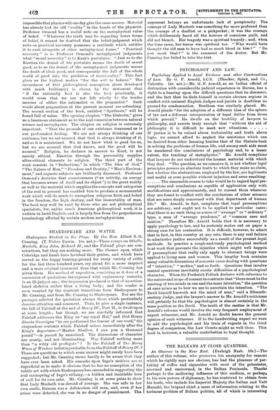PSYCHOLOGY AND LAW.
Psychology Applied to Legal Evidence and other Constructions of Law. By G. F. Arnold, I.C.S. (Thacker, Spink, and Co., Calcutta. 12s. net.)—Mr. G. F. Arnold, as an Indian official of distinction with considerable judicial experience in Burma, has a right to a hearing upon the difficult questions that he discusses, and the fact that he finds himself in certain obscure regions in conflict with eminent English Judges and jurists is doubtless no ground for condemnation. Bentham was similarly placed. Mr. Arnold pleads "for the adoption of a different idea of the sphere of law and a different interpretation of legal duties from those which prevail." He dwells on the hostility of lawyers to philosophy, and asserts truly enough that "without the aid of philosophy it i3 difficult to meet new situations If justice is to be valued above technicality and truth above logic, we cannot afford to neglect the assistance which can be derived from other learning besides that of the Statute-book in solving the problems of human life, and among such aids must be numbered the conclusions of psychology and, to a lesser extent, the teaching of metaphysics," Mr. Arnold complains that lawyers do not understand the human material with which they deal. "The question, as we conceive it, is not whether legal principles possess an absolute truth to which they make no claim, but whether the abstractions, employed by the law, are legitimate and useful or even possible without injustice and error resulting.
The reasonable course to take would be to regard legal pre- sumptions and conclusions as capable of application only with modifications and approximately, and to correct them wherever they are found to conflict with the conclusions of other sciences that are more deeply concerned with that department of human life." Mr. Arnold, in fact, complains that legal presumptions are arbitrary, and ought not to be applied to particular cases; that there is no such thing as a man of " average" or " ordinary " type, a man of "average prudence," of "common care and caution." Therefore Mr. Arnold holds that it is necessary to apply psychology to law, and he certainly makes out on paper a strong case for his contention. It is difficult, however, to admit that in fact, in this country at any rate, there is any real failure to administer justice successfully as a result of the present legal methods. In practice a rough-and-ready psychological method is at work that prevents the injustice which might well happen if presumptions that really only apply to abstract beings were applied to living men and women. This lengthy book contains many valuable discussions of concrete cases dealing with questions of " intention," " motive," and so forth. Questions that involve mental operations inevitably create difficulties of a psychological character. When Sir Frederick Pollock declares with reference to the nature and scope of consent in contracts that "there must be the meeting of two minds in one and the same intention," the question at once arises as to how we are to ascertain the intention. "The Devil himself knoweth not the mind of man," said a fifteenth- century Judge, and the lawyer's answer to Mr. Arnold's criticisms will probably be that the psychologist is almost certainly in the same position as the Devil. The truth of the matter is that Mr. Arnold's reforms would involve the very frequent employment of expert witnesses, and Mr. Arnold no doubt knows the general opinion of such witnesses. If to the handwriting expert we were to add the psychologist and his train of experts in the third degree of comparison, the Law Courts might as well close. This book is, however, a valuable contribution to legal thought.






























































 Previous page
Previous page